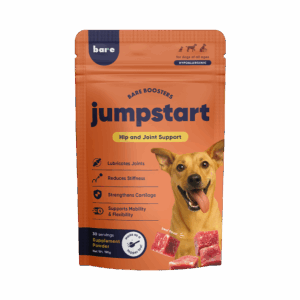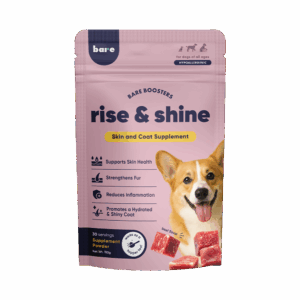Switching your dog to a new food might seem like a simple task, but it’s a process that requires careful planning. Whether you’re upgrading to a higher-quality kibble, introducing wet food, or switching to a different dog food brand entirely, a gradual transition is crucial for keeping your furry friend healthy and happy.
Abrupt changes in your dog’s diet can lead to digestive upset, including diarrhea, vomiting, or a lack of appetite. To avoid these issues, it’s important to follow a step-by-step approach when transitioning your dog to new food. In this guide, we’ll walk you through everything you need to know about safely changing your dog’s diet, along with product recommendations from Bare Pets to make the process even smoother.
Why Transitioning Dog Food Gradually is Important
Dogs have sensitive digestive systems, and sudden changes in their diet can disrupt the balance of gut bacteria. This can lead to:
- Digestive Upset: Symptoms include diarrhea, gas, or vomiting.
- Refusal to Eat: Your dog may reject the new food if it is introduced too quickly.
- Nutritional Imbalance: A rushed transition can prevent your dog from fully adapting to the new food’s nutrients.
By transitioning gradually, you allow your dog’s digestive system to adjust, minimizing the risk of any adverse reactions.
Step-by-Step Guide: How to Transition Dog Food
Follow these steps to ensure a smooth transition when switching dog food brands or introducing a new type of food:
Step 1: Choose the Right Food
Before making the switch, research and choose a high-quality food that meets your dog’s nutritional needs. At Bare Pets, we offer a variety of premium options, including:
- Candidly Fresh Chicken Adult Dog Kibble: Packed with protein and probiotics to support digestion.
- Cluckin’ Good Adult Wet Dog Food: A flavorful wet food option made with real chicken.
- Bare Essentials All-in-One Dog Supplement: A multivitamin to support overall health during the transition.
Step 2: Gradual Introduction
Start by mixing a small amount of the new food with your dog’s current food. Over 7-10 days, gradually increase the proportion of the new food while decreasing the proportion of the old food.
Here’s a sample schedule:
- Days 1-2: 75% old food, 25% new food.
- Days 3-4: 50% old food, 50% new food.
- Days 5-6: 25% old food, 75% new food.
- Day 7+: 100% new food.
If your dog shows signs of digestive upset, slow down the transition process and give their system more time to adjust.
Step 3: Monitor Your Dog’s Reaction
Monitor your dog’s behavior, stool quality, and appetite closely during the transition. If you notice any persistent issues, consult your veterinarian for guidance.
Tips for a Successful Transition
1. Add Digestive Support
Switching dog food brands can sometimes disrupt your dog’s gut health. To support their digestion, consider adding a probiotic supplement, such as our Good Gut Dog Supplement. This supplement helps maintain a healthy gut microbiome, reducing the risk of digestive upset.
2. Mix Kibble and Wet Food
If your dog is hesitant to try the new food, mixing kibble with wet food can make it more appealing. For example, you can combine Candidly Fresh Beef Adult Dog Kibble with Seriously Beefy Adult Wet Dog Food for a flavorful and nutritious meal.
3. Use Food Toppers or Broth
Enhance the flavor of the new food by adding a small amount of low-sodium chicken broth or a food topper. This can encourage picky eaters to try the new food.
4. Stick to a Feeding Schedule
Consistency is key when transitioning your dog’s food. Feed your dog at the exact times each day to help regulate their digestion and appetite.
Common Challenges When Switching Dog Food
1. Picky Eaters
Some dogs are naturally selective about their food. If your dog is reluctant to try the new food, start with small portions and gradually increase the amount over time. You can also add a wet food option, like Cluckin’ Good Puppy Wet Dog Food, to make the meal more enticing.
2. Sensitive Stomachs
Dogs with sensitive stomachs may require a slower transition or a specialized diet to manage their condition. Our Candidly Fresh Lamb Hypoallergenic Adult Dog Kibble is a great option for dogs with food sensitivities.
3. Weight Management
If you’re transitioning to a new food to address weight concerns, be sure to measure portions carefully. Overfeeding can lead to weight gain, while underfeeding can leave your dog hungry and irritable.
Supplements to Support Your Dog’s Transition
Adding supplements to your dog’s diet can help ease the transition process and support their overall health. Here are some recommendations:
- Good Gut Dog Supplement: Supports healthy digestion and helps reduce the risk of stomach upset.
- Jumpstart Joint Support Dog Supplement: Ideal for senior dogs transitioning to a new diet.
- Rise and Shine Skin Health Dog Supplement: Supports a healthy coat and skin during dietary changes.
When to Consult a Veterinarian
While most dogs adapt well to a new diet with proper transitioning, there are times when professional advice is necessary. Consult your vet if:
- Your dog experiences persistent diarrhea or vomiting.
- They refuse to eat the new food after several days have passed.
- You’re switching to a specialized diet for medical reasons.
Why Choose Bare Pets for Your Dog’s Food?
At Bare Pets, we’re passionate about helping pet parents provide the best nutrition for their furry friends. Our range of kibble, wet food, and supplements is carefully curated to meet the unique needs of dogs in the Philippines.
Here’s what sets us apart:
- Premium Ingredients: Our products are made with high-quality, natural ingredients.
- Variety: From hypoallergenic kibble to protein-rich wet food, we have options for every dog.
- Convenience: Shop online and have your dog’s food delivered straight to your door.
Transitioning your dog to a new food doesn’t have to be stressful. By following a gradual approach, monitoring your dog’s reaction, and incorporating digestive support, you can ensure a smooth and successful switch.
Ready to upgrade your dog’s diet? Explore our range of kibble and wet food today, or contact us for personalized recommendations. Your furry friend will thank you!




